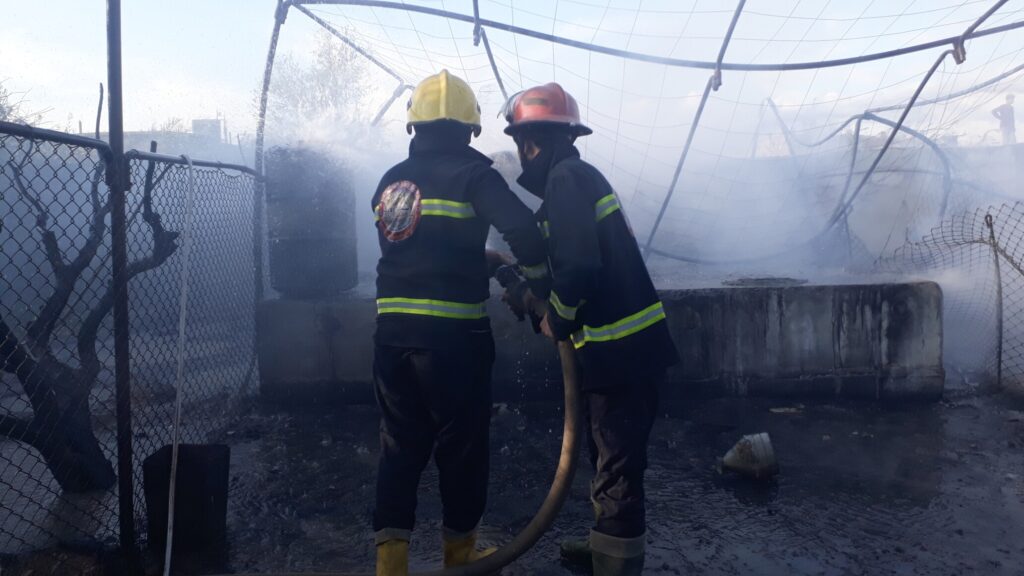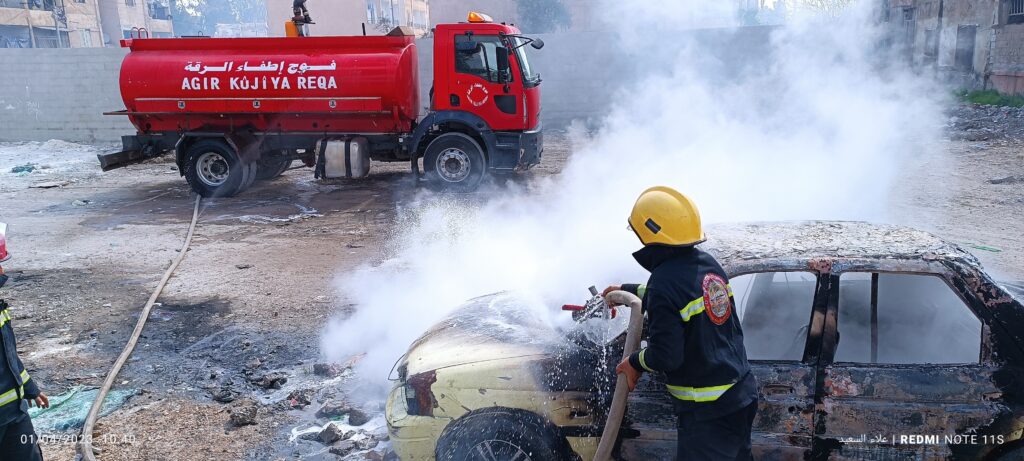Firefighters are saving lives, improving local governance in Northeastern Syria
By Andrew Aulner
On the outskirts of Raqqa, cotton warehouses dot the landscape as farmers across the region bring in their annual harvest – the second most important agricultural product in Northeastern Syria. Unfortunately, harvest season is also fire season. On a hot day this summer, the two seasons collided when a massive fire broke out in a cotton center north of Raqqa.
“It was a very big fire,” recalled Turki Mohamad, the fire brigade leader. “Because of the magnitude of the fire, all the firefighters in the main brigade of Raqqa, the Sahlabiya center, the Hazima center and two fire engines with their teams from the Tabqa Fire Brigade responded.”
After hours of nonstop efforts, the firefighters were able to control and extinguish the blaze, saving cotton and earning recognition from residents and the elected Municipal Committee.
In the provinces of Raqqa, Hasakah, Tabqa and Deir Ezzor in Northeast Syria, firefighters face a daunting challenge. After years of war and few basic resources, they lacked the equipment and training required to fight fires.
The firefighters who responded to the cotton warehouse blaze were fortunate as they recently received professional training and modern equipment to take on the most common incidents in their areas. It is part of a new effort to provide critical local services to residents in areas liberated from the Syrian regime and violent extremists.

While saving lives and property are the firefighters’ main objectives, they are playing a larger role in northeastern Syria as local councils look to build a connection between residents and government service providers in a region that is struggling to rebuild itself.
With funding and support from the U.S. State Department’s Bureau of Near Eastern Affairs, the Facilitating Urban Recovery and Transition (FURAT III) program is working with elected and appointed officials to identify basic services required by residents.
Through these efforts, FURAT III program aims to strengthen local governance partners in northeastern Syria. The three-year program is designed to support local officials and citizens living outside the regime’s control in the northeastern region of the country, with an emphasis on women, youth and religious and ethnic minorities.
“The FURAT III program is designed to support local governance entities and build their capacities to better manage services,” says Mohamad Hamish, FURAT III’s team lead. These services include water, sanitation, electricity and roadwork.
The team is training committees on data collection, management, surveying and other skills that empower local governments to better serve their people. FURAT III emphasizes governmental transparency, coordination between authorities and residents and outreach that allows northeastern Syrian locals to participate in the governance process.
Mahmoud Abdo, a trainer with Raqqa’s First Responders Team, says the firefighters support building the relationship between the local council and the community by taking several important steps, particularly by demonstrating their competence and readiness to protect the community from extinguishing blazes to creating safe swimming areas in the Euphrates River.
“Taken together, they contributed to strengthening the connection and common understanding between firefighters and the community,” Abdo says.
With social cohesion and community involvement as high priorities, the initial decision of where the program needed to provide its support was a joint process. Based on the needs of residents, the current capabilities of emergency services and the unprecedented threat posed to agriculture, including those caused by regional conflict, communities decided to focus their attention on first responders.
“In regions frequently facing conflicts, airstrikes or natural disasters, bolstering firefighting capabilities is paramount for public safety,” Hamish explains. Much of the critical support included specialized equipment and skills training for firefighters – particularly as regional conflict continues to touch the liberated areas.

SPECIALIZED TRAINING & MODERN EQUIPMENT
As the regional conflict drained resources from communities, local firefighters lacked vital supplies, such as foam used for fighting oil-based wildfires, and essential training to battle fires.
Professional instruction in a wide variety of skills – such as the management of hazardous waste and standard protocols necessary for maintaining operational safety when battling a wildfire – are now available to first responders.
The program is working with the International Safety Training College to ensure that these first responders are proficient and prepared with the latest firefighting techniques and methods. The Malta-based school provides agencies with training in various areas of firefighting, emergency response and hazmat management. These skills-based training programs allow for ongoing instruction of local firefighting units even after FURAT III has left the region.
That specialized training was put to the test in the Al Jazeera region’s city of Qamishli on Oct. 5, 2023, when fighter jets and drones attacked strategic infrastructure that supports the city. One of the drones targeted the city’s power station.
“The fire was huge and scary; I was close when the station was bombed,” recalls a resident who witnessed the explosion.
Firefighters trained by FURAT II quickly responded.
“We heard the sound of violent explosions that shook the city of Qamishli, and we learned that the main power station had been bombed,” says a member of the Qamishli fire brigade. “We quickly went to the station with several fire trucks. When we approached the station, we found thick smoke emanating from the station. The bombing targeted the fuel tanks, and the fire was large.”
Using their newly acquired training, firefighters were able to extinguish the blaze at the Amuda power station within 20 minutes.
The resident who witnessed the fire was impressed. “The firefighters looked experienced and familiar with what they were doing. And, indeed, they were able to extinguish the fire in a short time,” the resident says.
FIRE TRACKING DASHBOARD & FIRE SAFETY PROGRAMS
Leveraging new technology and ensuring collaboration through municipal government, local officials developed a fire incident dashboard that offers detailed insights into the causes, response times, dates and types of fire incidents.
With the help of the dashboard, patterns and root causes of fires can be identified, providing crucial insights for the development of targeted preventive measures.
This comprehensive data set serves as a critical tool, enabling the discernment of patterns and derivation of insights into the dynamics of fire incidents. The ability to analyze these specific causes and trends has revolutionized the approach to fire prevention and response.
“The success of the firefighting activities dashboard is a shining example of how data-driven decision-making can enhance public safety,” says the Head of the Executive Council in Al Jazeera Region. “It is not just a tool; it is a game-changer, empowering firefighting brigades with the information they need to better protect their communities. This initiative has set a new standard for firefighting efforts in the region, highlighting the transformative power of technology in emergency response.”
This tracking tool offers transparency and advises local civilian populations about both past and present firefighting efforts, empowering civilians through greater knowledge of the activities of their frontline emergency responders.
The dashboard allows authorities to more effective plan and implement outreach efforts that further increase the bonds between communities and their governments.
These awareness campaigns are designed to educate civilians on fire safety measures and prevention techniques. The hope of these campaigns is to foster a culture of fire safety among civilians, with the idea that this in turn will diminish the likelihood of future wildfire outbreaks.
With editing by Michael J. Zamba
